Narrow Results By
Subject
- Academic Disciplines 3
- Accidents 14
- Accidents - Automobile Accidents 31
- Accidents - Train Accidents 23
- Adminstrative Groups - Committees 4
- Adornment 83
- Adornment - Jewelry 11
- Adornment - Lapel Pins 84
- Advertising Medium 104
- Advertising Medium - Business Cards 17
- Advertising Medium - Flyer 38
- Advertising Medium - Poster 18
Hong family harvesting green onions at Hop-On Farm
https://search.heritageburnaby.ca/link/museumdescription4260
- Repository
- Burnaby Village Museum
- Date
- [198-] (date of original), copied 2017
- Collection/Fonds
- Burnaby Village Museum Photograph collection
- Description Level
- Item
- Physical Description
- 1 photograph : colour : copy scan
- Scope and Content
- Photograph of two women of the Hong family in hats crouching in a field of green onions, harvesting at Hop-On Farm. Farm buildings and houses evident in background.
- Repository
- Burnaby Village Museum
- Collection/Fonds
- Burnaby Village Museum Photograph collection
- Description Level
- Item
- Physical Description
- 1 photograph : colour : copy scan
- Scope and Content
- Photograph of two women of the Hong family in hats crouching in a field of green onions, harvesting at Hop-On Farm. Farm buildings and houses evident in background.
- History
- Josephine Hong was born to Sui Ha Hong and Chan Kow Hong. The Hong Family had seven children, oldest to youngest: Pauline, Josephine, Catherine, Norine, Gary, Darlene, and Marlene. The family runs Hop-On Farm on Marine Drive in Burnaby. Many Hong family members worked on the farm including Josephine Hong's grandfather, Gay Tim Hong, and uncles. Her great-grandfather was Sui Wing Hong
- Subjects
- Persons - Chinese Canadians
- Names
- Hop On Farms
- Geographic Access
- Byrne Road
- Accession Code
- BV017.36.11
- Access Restriction
- No restrictions
- Reproduction Restriction
- May be restricted by third party rights
- Date
- [198-] (date of original), copied 2017
- Media Type
- Photograph
- Historic Neighbourhood
- Fraser Arm (Historic Neighbourhood)
- Related Material
- See Oral History Interview-BV020.6.1
- Scan Resolution
- 800
- Scan Date
- 12/3/2017
- Scale
- 100
- Notes
- Title based on contents of photograph.
Images
Hong family harvesting radishes at Hop-On Farm
https://search.heritageburnaby.ca/link/museumdescription4256
- Repository
- Burnaby Village Museum
- Date
- [August 1963] (date of original), copied 2017
- Collection/Fonds
- Burnaby Village Museum Photograph collection
- Description Level
- Item
- Physical Description
- 1 photograph (tiff) : 600 dpi
- Scope and Content
- Photograph of Hong family members bent over plants, harvesting radishes at Hop-On Farm, August 1963. Woman holding baby in background with wooden crates.
- Repository
- Burnaby Village Museum
- Collection/Fonds
- Burnaby Village Museum Photograph collection
- Description Level
- Item
- Physical Description
- 1 photograph (tiff) : 600 dpi
- Scope and Content
- Photograph of Hong family members bent over plants, harvesting radishes at Hop-On Farm, August 1963. Woman holding baby in background with wooden crates.
- History
- Josephine Hong was born to Sui Ha Hong and Chan Kow Hong. The Hong Family had seven children, oldest to youngest: Pauline, Josephine, Catherine, Norine, Gary, Darlene, and Marlene. The family runs Hop-On Farm on Marine Drive in Burnaby. Many Hong family members worked on the farm including Josephine Hong's grandfather, Gay Tim Hong, and uncles. Her great-grandfather was Sui Wing Hong
- Subjects
- Persons - Chinese Canadians
- Names
- Hop On Farms
- Geographic Access
- Byrne Road
- Accession Code
- BV017.36.7
- Access Restriction
- No restrictions
- Reproduction Restriction
- May be restricted by third party rights
- Date
- [August 1963] (date of original), copied 2017
- Media Type
- Photograph
- Historic Neighbourhood
- Fraser Arm (Historic Neighbourhood)
- Related Material
- See Oral History Interview-BV020.6.1
- Scan Resolution
- 800
- Scan Date
- 12/3/2017
- Scale
- 100
- Notes
- Title based on contents of photograph.
Images
Immigration department Hong Kong arrival and departure card
https://search.heritageburnaby.ca/link/museumdescription14790
- Repository
- Burnaby Village Museum
- Date
- [197-]
- Collection/Fonds
- Julie Lee and Cecil Lee family fonds
- Description Level
- Item
- Physical Description
- 2 p.
- Scope and Content
- Item consists of a blank Immigration Department of Hong Kong Arrival and Departure Card.
- Repository
- Burnaby Village Museum
- Collection/Fonds
- Julie Lee and Cecil Lee family fonds
- Description Level
- Item
- Physical Description
- 2 p.
- Material Details
- Text in both English and Chinese
- Scope and Content
- Item consists of a blank Immigration Department of Hong Kong Arrival and Departure Card.
- Accession Code
- BV019.6.4
- Access Restriction
- No restrictions
- Reproduction Restriction
- May be restricted by third party rights
- Date
- [197-]
- Media Type
- Textual Record
- Scan Resolution
- 600
- Scan Date
- 29-Sept-2020
- Scale
- 100
- Notes
- Title based on content of item
- Item is part of a scrapbook album created by Cecil Lee
Images
Immigration form
https://search.heritageburnaby.ca/link/museumdescription14788
- Repository
- Burnaby Village Museum
- Date
- [197-]
- Collection/Fonds
- Julie Lee and Cecil Lee family fonds
- Description Level
- Item
- Physical Description
- 1 p.
- Scope and Content
- Item consists of a blank immigration form requiring; full name; nationality; sex; date and room no.
- Repository
- Burnaby Village Museum
- Collection/Fonds
- Julie Lee and Cecil Lee family fonds
- Description Level
- Item
- Physical Description
- 1 p.
- Material Details
- Text in both English and Chinese
- Scope and Content
- Item consists of a blank immigration form requiring; full name; nationality; sex; date and room no.
- Accession Code
- BV019.6.2
- Access Restriction
- No restrictions
- Reproduction Restriction
- May be restricted by third party rights
- Date
- [197-]
- Media Type
- Textual Record
- Scan Resolution
- 600
- Scan Date
- 29-Sept-2020
- Scale
- 100
- Notes
- Title based on content of item
- Item is part of a scrapbook album created by Cecil Lee
Images
Interview with Denise Fong by Rose Wu and Wei Yan Yeong
https://search.heritageburnaby.ca/link/museumdescription14276
- Repository
- Burnaby Village Museum
- Date
- 2020
- Collection/Fonds
- Burnaby Village Museum fonds
- Description Level
- Item
- Physical Description
- 1 sound recording (mp3) (00:60:38 min.)
- Scope and Content
- Item consists of an audio recording of a Zoom interview with Denise Fong conducted by Rose Wu and Wei Yan Yeong, in the Faculty of Land and Food Systems at UBC. The interview was conducted with Denise Fong as part of the students' research for their podcast "Where is your food from?". This podcast…
- Repository
- Burnaby Village Museum
- Collection/Fonds
- Burnaby Village Museum fonds
- Series
- UBC Partnership series
- Description Level
- Item
- Physical Description
- 1 sound recording (mp3) (00:60:38 min.)
- Material Details
- Interviewers: Rose Wu; Wei Yan Yeong Interviewee: Denise Fong Interview Date: September 2020 Total Number of tracks: 1 Total Length of all tracks: 00:60:38 Recording device: Zoom video communication platform Photograph info: Store front of Way Sang Yuen Wat Kee & Co in Victoria, B.C., 1975. BV017.7.191
- Scope and Content
- Item consists of an audio recording of a Zoom interview with Denise Fong conducted by Rose Wu and Wei Yan Yeong, in the Faculty of Land and Food Systems at UBC. The interview was conducted with Denise Fong as part of the students' research for their podcast "Where is your food from?". This podcast was part two in a series of three "Back to the Roots" podcasts about the history of Chinese-Canadian farming in Burnaby and the lower mainland. In this series the students connected their knowledge of food systems to their shared Chinese heritage in order to discover how Chinese Canadian history is rooted in their local food systems. "Where is your food from?" explores contemporary versus historical alternative food movements and how early Chinese farmers in the lower mainland had to be creative in their business tactics in order to survive in a local food system that discriminated against their race. 00:00 - 4:51 Denise Fong introduces herself and provides a summary of the work that she has done while working as a researcher on the Chinese Canadian History Research project for the Burnaby Village Museum. Denise explains how much of her research has focused on the history of Chinese Canadian market gardeners and green grocers and their presence in Burnaby. Denise tells of how many Chinese immigrants found it hard to find work due to racial discrimination which led many Chinese men to work in agriculture and farming. Her research has shown that many of the Chinese farms were located in the Big Bend area of Burnaby. 04:52 – 08:24 In this segment, Denise elaborates on the “truck” or “market” farming industry for Chinese farmers in Burnaby. Denise explains how “truck” farming was a mode for distributing produce from Chinese farms and some of the challenges the Chinese farmers faced. 08:25 – 14:10 In this segment Denise talks about peddling as another mode to distribute farm produce and how this was often dominated by Chinese Canadians since they were restricted from accessing other jobs. Denise explains how the Chinese peddlers would have their own routes with customers who depended on them to bring the produce to them. Denise provides an example of racial discrimination whereby a Burnaby Bylaw prevented people of Chinese descent from working for the city. 14:11 – 22: 39 In this segment, Denise describes how in the 1950s and 1960s, produce distribution networks for Chinese Canadian farmers in Burnaby expanded to larger stores and wholesalers including Woodward’s, Safeway in Burnaby, MacDonald’s Consolidated and Kelly Douglas. Denise provides specific examples of Burnaby families and tells the story of Chinese Canadian Cecil Lee, a produce buyer for Kelly Douglas. In the mid 1970s Lee, was asked to oversee the import of Chinese mandarin oranges into Canada and was responsible for the design of a new cardboard box to replace the wooden crates that held the mandarin oranges. 22:40 – 33:28 In this segment, Denise provides information on Chinese farming methods and practices that she gathered through her research. Information gathered from interviews, research papers and an article in Harrowsmith magazine suggest that many of the Big Bend farms in Burnaby relied on crop rotation, companion planting and intercropping along with traditional organic fertilizers that were available. Denise also tells of how Chinese farmers often relied on traditional methods that they brought from Southern China including the creation of raised beds to avoid damage due to flooding. Wei Yan comments that many of these traditional methods are being reintroduced as a new sustainable way of farming. Research done by Wei Yan found that when chemical fertilizers were introduced informational brochures included Chinese translations. 33:29 – 38:30 In this segment Rose and Wei Yan speak to Denise about the cultural demographic of farmers in the Big Bend area of Burnaby and what types of crops were grown. Denise comments that to her knowledge there were mostly Chinese farmers in this area but there were some European farmers as well. Produce that was grown on the farms was mostly market driven by the local consumers and it wasn’t until the 1970s that there was a bigger demand to grow Chinese vegetables to supply the growing Chinese population. Denise shares personal experience of what she learned after a visit to a local farm and the different methods that the farmer used for growing crops. The three discuss the importance of innovation and adaptability in growing techniques that Chinese farmers have used. 38:31 – 46:23 In this segment, Rose and Wei Yan speak to Denise about the discrimination barriers that Chinese farmers had to face. Denise speaks about discriminatory bylaws and regulations that targeted Chinese farmers including the Peddling tax. She tells of how this tax, persecution to peddlers and restrictions resulted in the emergence of a new industry of Chinese green grocers. Denise names Chinese trade organizations that were formed in response to the social and economic segregation and marginalization that Chinese farmers and retailers faced. Denise references research done by Natalie Gibb and Hannah Wittman from their article “Parallel Alternatives: Chinese-Canadian farmers and the Metro Vancouver local food movement” as well as research by Harry Con and Edgar Wickberg. Denise also provides information that she has gathered from Chinese farmers in Burnaby including the Yip family who were able to purchase land after World War II through the Veterans Land Act and how prior to World War II it was very difficult for Chinese immigrants to purchase land. 46:24 – 1:00:38 In this segment the group discusses how Chinese farmers have adapted in the market garden farm distribution system and the introduction of retail spaces on their farms as part of the new local food movement. Denise, Rose and Wei Yan reflect on how their interview with Denise Fong and research resources will support their podcast series and exhibits at Burnaby Village Museum.
- History
- Interviewer biographies: Rose Wu and Wei Yan Yeong are University of British Columbia students in the Faculty of Land and Food Systems and student interns at Burnaby Village Museum. Interviewee biography: Denise Fong is a historical researcher at Burnaby Village Museum. She has degrees in Anthropology (BA) and Archaeology (MA), and is completing her doctoral degree at UBC in Interdisciplinary Studies. Her primary research interests are in Chinese Canadian history and critical heritage studies. She is the co-curator of the Burnaby Village Museum “Across the Pacific” exhibition, and the Museum of Vancouver’s “A Seat at the Table – Chinese Immigration and British Columbia”.
- Creator
- Burnaby Village Museum
- Subjects
- Persons - Chinese Canadians
- Social Issues - Discrimination
- Social Issues - Racism
- Agriculture
- Agriculture - Crops
- Agriculture - Farms
- Gardens - Market Gardens
- Foods
- Names
- Fong, Denise
- Responsibility
- Wu, Rose
- Yeong, Wei Yan
- Accession Code
- BV020.28.2
- Access Restriction
- No restrictions
- Reproduction Restriction
- No known restrictions
- Date
- 2020
- Media Type
- Sound Recording
- Related Material
- BV020.28.4
- Notes
- Title based on contents of recording
- Item was originally recorded as an mp4 video and converted to an mp3 sound recording for public access on Heritage Burnaby. To access the video recording, contact Burnaby Village Museum.
- For recording of podcast "Where is your food from?" see BV020.28.4
Images
Audio Tracks
Interview with Denise Fong by Rose Wu and Wei Yan Yeong, 2020
Interview with Denise Fong by Rose Wu and Wei Yan Yeong, 2020
https://search.heritageburnaby.ca/media/hpo/_Data/_BVM_Sound_Recordings/Sound_Recordings/2020_0028_0002_002.mp3Interview with Dr. John Yang by Rose Wu and Wei Yan Yeong
https://search.heritageburnaby.ca/link/museumdescription14277
- Repository
- Burnaby Village Museum
- Date
- August 2020
- Collection/Fonds
- Burnaby Village Museum fonds
- Description Level
- Item
- Physical Description
- 1 video recording (mp4) (66 min., 57 sec.) : digital, col., sd., stereo
- Scope and Content
- Item consists of a video recording of a Zoom interview with Dr, John Yang conducted by Rose Wu and Wei Yan Yeong, UBC students in the UBC Faculty of Land and Food Systems. The interview was conducted with Dr. Yang as part of the students' research for "Chinese Herbalist Shops and TCM", part three i…
- Repository
- Burnaby Village Museum
- Collection/Fonds
- Burnaby Village Museum fonds
- Series
- UBC Partnership series
- Description Level
- Item
- Physical Description
- 1 video recording (mp4) (66 min., 57 sec.) : digital, col., sd., stereo
- Material Details
- Interviewers: Rose Wu; Wei Yan Yeong Interviewee: Dr. John Yang Interview Date: August 2020 Total Number of tracks: 1 Total Length of all tracks: 01:06:57 Recording Device: Zoom video communication platform
- Scope and Content
- Item consists of a video recording of a Zoom interview with Dr, John Yang conducted by Rose Wu and Wei Yan Yeong, UBC students in the UBC Faculty of Land and Food Systems. The interview was conducted with Dr. Yang as part of the students' research for "Chinese Herbalist Shops and TCM", part three in a series of "Back to the Roots" podcasts. The podcast series explores the history of Chinese-Canadian farming in Burnaby and the lower mainland. In this series the students connected their knowledge of food systems to their shared Chinese heritage in order to discover how Chinese Canadian history is rooted in their local food systems. The majority of the interview was conducted in english with occasional comments spoken in mandarin by Wei Yan Yeong and Dr. John Yang. 00:00 – 15:13 The video interview opens with Wei Yan Yeong providing a brief synopsis of the project that she is working on in partnership with Rose Wu. She explains to Dr. John Yang that the content from this interview will help inform podcast episode number three “Chinse Herbalist Shops and TCM”. Dr. Yang responds to questions asked by Wei Yan and Rose. Dr. Yang explains why he first came to Canada from China more than thirty years ago and provides information on his educational background. He describes how he first earned a degree in western medicine in China and became an assistant professor at a medical school before turning to study Traditional Chinese Medicine (TCM) by completing a PHD from Guangzhou University of Chinese Medicine. When he immigrated to Canada with his wife more than thirty years ago, he decided to continue to practice TCM . 15:14 – 21:53 In this segment of the interview, Rose Wu asks if he joined an existing TCM business or whether he started his own practice. Dr. Yang explains that he practiced on his own and that TCM wasn’t licensed in Canada until 1996. He further explains how Western medicine was the only regulated medical practice used in Canada and it took a long time to lobby the government to recognize the benefits of TCM and why it should be a licensed profession. 21:58 – 25:00 In this segment of the interview Dr. Yang speaks about his experience as a doctor of TCM in Burnaby, his role as the president of the Federation of Traditional Chinese Medicine Colleges of Canada and how they lobbied the government for more recognition and his professional work as a dean and clinical director of the Kwantlen Polytechnic University’s Traditional Chinese Medicine program. 27:36 – 47:07 In this segment Dr. Yang explains how Traditional Chinese Medicine is ingrained in the Chinese culture and part of daily life which is why many Chinese immigrants rely on TCM to protect their immune system. He explains how TCM is based on four different energies (cold, hot, warm and cool) and different from traditional western medicine. He provides examples of different energies from certain foods. 47:08 – 52:13 In this segment, Dr. Yang speaks about his experience as a practitioner of TCM in the treatment of patients, how many of his patients are not Chinese and how he treats many of his patients with acupuncture. Dr. Yang provides an example of a patient being treated with acupuncture for a frozen shoulder. 52:14 – 56:43 In this segment, Dr. Yang is asked if he also uses Western medicine. Dr. Yang shares his positive experiences treating fever with acupuncture and how growing up in China that there was no access to western medicine – no antibiotics or penicillin until the last 50 years or so. He explains that this is why Chinese people have always relied on TCM. 56:44 - 1:06:57 Dr. Yang provides information on the education required to become a registered acupuncturist and a licensed TCM practitioner. He explains that herbs used in TCM can be purchased from herbalist shops in Chinatown or you can purchase concentrations of the herbs directly from your TCM doctor. He clarifies how animal products that are restricted (including shark fins) are no longer included for treatments in TCM, all TCM herbs are regulated in Canada by the FDA whereas herbs that you buy in Chinatown are treated as food and not drugs.
- History
- Interviewer biographies: Rose Wu and Wei Yan Yeong are University of British Columbia students in the Faculty of Land and Food Systems and student interns at Burnaby Village Museum. Interviewee biography: Dr. John Yang is a chairperson and program director of Kwantlen Polytechnic University's Traditional Chinese Medicine program. Dr. John Yang graduated from Hainan University Medical School, Haikou, China. He received his TCM training at Hainan Provincial Hospital of TCM, Haikou, China and a PhD from Guangzhou University of Chinese Medicine, China. For the past 11 years, John has been the Dean and Clinic Director at the PCU College of Holistic Medicine, Burnaby. As an expert in the field, John has given many national and international presentations and lectures on TCM. Dr. Yang is the current Vice-President at the Association of Traditional Chinese Medicine and Acupuncture of British Columbia (ATCMA). He is also the Chair of the Academic/Educational Committee of ATCMA. Dr. Yang is the current President of the Federation of Traditional Chinese Medicine Colleges of Canada and a committee member on the Standards Council of Canada, Canadian Advisory Committees for International Organization for Standardization for TCM. John was elected as professional board member at the College of Traditional Chinese Medicine Practitioners and Acupuncturists of British Columbia (CTCMA). He was also a member of the Audit Team (Topic Specialist) for the Private Career Training Institution Agency of British Columbia (PCTIA), along with numerous past appointments to other TCM provincial, national and international committees.
- Subjects
- Persons - Chinese Canadians
- Social Issues - Discrimination
- Social Issues - Racism
- Public Services - Health Services
- Regulations
- Accession Code
- BV020.28.1
- Access Restriction
- Restricted access
- Reproduction Restriction
- May be restricted by third party rights
- Date
- August 2020
- Media Type
- Moving Images
- Related Material
- BV020.28.5
- Notes
- Title based on contents of video recording
- For recording of podcast "Chinese Herbalist Shops and TCM" - see BV020.28.5
- Contact Burnaby Village Museum to view content
Images
Interview with Harry Toy, Beverley Babey and Christina Toy
https://search.heritageburnaby.ca/link/museumdescription20285
- Repository
- Burnaby Village Museum
- Date
- [1905-2023] (interview content), interviewed 25 Sep. 2023
- Collection/Fonds
- Burnaby Village Museum fonds
- Description Level
- Item
- Physical Description
- 1 sound recordings (wav) (121min., 14 sec.) + 1 sound recording (mp3) (121 min., 13 sec.)
- Scope and Content
- Item consists of a recording of an oral history interview with Harry Toy, Beverley Babey and Christina Toy conducted by Burnaby Village Museum researcher Denise Fong on September 25, 2023. The interview is divided into four sections: early life of Harry Toy, the Canada Way Food Market, the Fraser M…
- Repository
- Burnaby Village Museum
- Collection/Fonds
- Burnaby Village Museum fonds
- Series
- Museum Oral Histories series
- Subseries
- Many Voices Project Interviews subseries
- Description Level
- Item
- Physical Description
- 1 sound recordings (wav) (121min., 14 sec.) + 1 sound recording (mp3) (121 min., 13 sec.)
- Material Details
- Interviewer: Denise Fong Interviewees: Harry Toy, Beverley Babey and Christina Toy Location of Interview: Residence of Harry Toy Interview Date: September 25, 2023 Total Number of tracks: 1 Total Length of all Tracks: 02:01:13 Digital master recording (wav) was converted to mp3 for access on Heritage Burnaby
- Scope and Content
- Item consists of a recording of an oral history interview with Harry Toy, Beverley Babey and Christina Toy conducted by Burnaby Village Museum researcher Denise Fong on September 25, 2023. The interview is divided into four sections: early life of Harry Toy, the Canada Way Food Market, the Fraser Merchants’ Association and Harry's daughters, Beverley Babey and Christina Toy's memories of growing up in Burnaby. 00:00:00 – 00:23:53 Harry Toy shares biographical information about himself and his ancestors. Harry provides information about his migration to Canada and his life in Manitoba, attending school, working at the family restaurant and teaching high school. 00:23:53 – 00:41:16 Harry talks about moving his family to Burnaby and his experiences owning and operating the Canada Way Food Market. 00:41:17 – 00:54:19 Harry talks about his involvement with the Fraser Merchants Association (FMA) and provides some history about the organization. 00:54:20 – 1:22:44 Harry talks about running the Canada Way Food Market and the alterations that he made to the store over the years. Harry and his daughters comment as they look through photographs of Harry and his store and the Fraser Merchants Association. 1:22:45 – 2:01:14 Beverley and Christina talk about their early childhood in Manitoba and growing up in Burnaby. They recall what it was like growing up and working in the family owned store.
- History
- Interviewee biography: Harry Wee Koon Toy was born in February 9, 1936 in Taikong, Toisan county, Guangdong, China. Harry's father William Toy came to Canada in the early 1920s when he was ten years old. Harry arrived in Vancouver, Canada on September 9, 1950. After staying in Vancouver for one night, he joined his father in Neepawa, Manitoba where the family operated a cafe business (Royal Cafe). Harry grew up in Neepawa and graduated from the University of Manitoba and teacher's college. He became a high school teacher and worked at schools in Minnedosa and Gladstone, Manitoba teaching various subjects including, science, business, geography, history and physical education. Harry and his wife, had three daughters, Melinda, Beverley and Christina who were all born in Neepawa. When the family decided to move to the west coast, Harry was introduced to the grocery store business through an uncle who was a store operator. Around 1970, Harry purchased a grocery store at 4694 Canada Way in Burnaby which he named "Canada Way Food Market" and Harry and his daughters made their home at the back of the store. Harry owned and operated the store for approximately 40 years between 1970 and 2010. Around 1986, Harry purchased the butcher shop next door (4692 Canada Way) which was no longer in operation, expanding his store and adding a second storey to use a residence. Harry's children helped him operate the store throughout their childhood. In the early 1970s, corner stores were threatened by the spread of small chain-operated convenience stories from Eastern Canada to Vancouver. Formed in April 1972, the Fraser Merchants’ Association was established to protect the rights of corner store operators. With no paid legal help, the association was incorporated in Victoria, BC for the cost of 56 cents. The benefits of being a member of the association included warehouse and group purchasing, common advertising and other advantages of being part of an association. Founded by Gary Lee Ling and five others, Fraser Merchants’ Association’s first member was Graham Grocery. By 1978, the association represented over 200 corner stores in the Lower Mainland (Delta, Surrey, White Rock, Langley, Coquitlam, and New Westminster) and Fraser Valley. The association remained active into the 1980s and 1990s. Harry has served as President of the Fraser Merchants' Association from 1992 to present. Interviewer biography: Denise Fong is a historical researcher at Burnaby Village Museum. She has degrees in Anthropology (BA) and Archaeology (MA), and is completing her doctoral degree at UBC in Interdisciplinary Studies. Her primary research interests are in Chinese Canadian history and critical heritage studies. She is the co-curator of BVM’s “Across the Pacific” exhibition, and the Museum of Vancouver’s “A Seat at the Table – Chinese Immigration and British Columbia”.
- Creator
- Burnaby Village Museum
- Subjects
- Education
- Migration
- Occupations - Teachers
- Occupations - Grocers
- Organizations
- Organizations - Business Associations
- Persons - Chinese Canadians
- Social Issues
- Social Issues - Racism
- Buildings - Commercial - Grocery Stores
- Names
- Toy, Christina
- Toy, Harry Wee Koon "Harry"
- Babey, Beverley
- Canada Way Food Market
- Fraser Merchants' Association
- Responsibility
- Fong, Denise
- Geographic Access
- Canada Way
- Street Address
- 4694 Canada Way
- Accession Code
- BV023.16.19
- Access Restriction
- No restrictions
- Reproduction Restriction
- No known restrictions
- Date
- [1905-2023] (interview content), interviewed 25 Sep. 2023
- Media Type
- Sound Recording
- Related Material
- See also: BV023.25 - Harry Toy fonds
- Notes
- Title based on contents of item
- Transcription available
Documents
Audio Tracks
Interview with Harry Toy, Beverley Babey and Christina Toy, [1905-2023] (interview content), interviewed 25 Sep. 2023
Interview with Harry Toy, Beverley Babey and Christina Toy, [1905-2023] (interview content), interviewed 25 Sep. 2023
https://search.heritageburnaby.ca/media/hpo/_Data/_BVM_Sound_Recordings/Oral_Histories/2023_0016_0019_002.mp3Interview with Howe Lee, 2019
https://search.heritageburnaby.ca/link/museumdescription10266
- Repository
- Burnaby Village Museum
- Date
- February 20, 2019
- Collection/Fonds
- Burnaby Village Museum fonds
- Description Level
- Item
- Physical Description
- 1 sound recording (mp3) (01:18:41 min)
- Scope and Content
- Recording is an interview with Howe Lee conducted by BVM researcher Denise Fong. Mr. Lee describes growing up in Armstrong in the 1930s and 1940s, leaving to attend university, and becoming a teacher in Burnaby. He discusses his community involvement and the creation of the Chinese Canadian Militar…
- Repository
- Burnaby Village Museum
- Collection/Fonds
- Burnaby Village Museum fonds
- Series
- Museum Oral Histories series
- Subseries
- Chinese Canadians in Burnaby subseries
- Description Level
- Item
- Physical Description
- 1 sound recording (mp3) (01:18:41 min)
- Material Details
- Interviewer: Denise Fong Interviewee: Howe Lee Location of Interview: Burnaby Village Museum Interview Date: February 20, 2019 Total Number of tracks: 1 Total Length of all Tracks: 1:18:41
- Scope and Content
- Recording is an interview with Howe Lee conducted by BVM researcher Denise Fong. Mr. Lee describes growing up in Armstrong in the 1930s and 1940s, leaving to attend university, and becoming a teacher in Burnaby. He discusses his community involvement and the creation of the Chinese Canadian Military Museum Society. 00:00 – 20:39: Mr. Lee describes his family’s origins in China. Denise shows him a photograph of Armstrong and he uses it to show the location of his family’s property and other landmarks. He talks about his family’s life in Armstrong, their farm’s place in the Chinese produce supply system of the time, and the presence and life of Chinese people in British Columbia generally. Mr. Lee also relates how the Interior Vegetable Marketing Board’s policies affected the farm and his future prospects. 20:39 – 32:40: This portion of the recording pertains to Mr. Lee’s involvement with the Chinese Cultural Centre and how he developed an interest in commemorating and honouring Chinese pioneers and military veterans. He recalls his education in Armstrong and at U.B.C. and the community of Chinese students which first drew him to Vancouver’s Chinatown. 32:40 – 51:24: Mr. Lee describes his family and the Chinese community in Armstrong, using the photo to show the locations of the businesses. He recalls his involvement with youth groups, particularly the Cadets, and with local sports, noting that he faced very little discrimination there. Denise asks about the family’s farm and Mr. Lee identifies the family’s house in a drawing. 51:24 – 1:02:18: This portion of the recording pertains to Mr. Lee’s education and career. He describes his enjoyment of being a leader in various groups and activities, and his interest in the local Chinese community. He explains the structure and operation of the cadets and shares his perspective of its value in leadership training. 1:02:18 – 1:18:46: Mr. Lee recalls how he became involved with veterans and with the Chinese Cultural Centre in Vancouver. He talks about bringing his parents to Burnaby to live. Mr. Lee describes how he persuaded some veterans to reorganize their group under the Army, Navy & Air Force Veterans in Canada. He discusses the importance of documenting and passing on the legacy of the Chinese veterans’ contribution and tells how he convinced some of them to create The Chinese Canadian Military Museum Society. Mr. Lee relates how his involvement with the local society led to involvement with a national group.
- History
- Howe Lee has worked in education, business, military and within the community. He has taught Science and Mathematics in several Burnaby Secondary Schools and was head of the Science Department and Edmonds Secondary School. Lee was appointed Honorary Colonel in 2012. He has been active within the Chinese-Canadian community including working with the Chinese Canadian Military Museum, Vancouver Chinatown Memorial Square, Asian Heriage Month Society and the Chinatown Revitalization. Interviewer biography: Denise Fong is a historical researcher at Burnaby Village Museum. She has degrees in Anthropology (BA) and Archaeology (MA), and is completing her doctoral degree at UBC in Interdisciplinary Studies. Her primary research interests are in Chinese Canadian history and critical heritage studies. She is the co-curator of BVM’s “Across the Pacific” exhibition, and the Museum of Vancouver’s “A Seat at the Table – Chinese Immigration and British Columbia”.
- Creator
- Burnaby Village Museum
- Responsibility
- Fong, Denise
- Accession Code
- BV019.15.1
- Access Restriction
- No restrictions
- Reproduction Restriction
- No known restrictions
- Date
- February 20, 2019
- Media Type
- Sound Recording
Audio Tracks
Interview with Howe Lee, 2019, February 20, 2019
Interview with Howe Lee, 2019, February 20, 2019
https://search.heritageburnaby.ca/media/hpo/_Data/_BVM_Sound_Recordings/Oral_Histories/2019_0015_0001_001.mp3Interview with Josephine Chow by Denise Fong February 7, 2020
https://search.heritageburnaby.ca/link/museumdescription12337
- Repository
- Burnaby Village Museum
- Date
- [1900-2020] (interview content), interviewed Feb. 7, 2020
- Collection/Fonds
- Burnaby Village Museum fonds
- Description Level
- Item
- Physical Description
- 1 sound recording (mp3) (00:43:19 min.)
- Scope and Content
- Recording consists of an interview with Josephine Chow (nee Hong) conducted by BVM researcher Denise Fong at the Burnaby Village Museum. Josephine describes her family history and recollects her childhood experiences in 1950s and 60s while growing with her family on their "Hop On" farm in Burnaby. …
- Repository
- Burnaby Village Museum
- Collection/Fonds
- Burnaby Village Museum fonds
- Series
- Museum Oral Histories series
- Subseries
- Chinese Canadians in Burnaby subseries
- Description Level
- Item
- Physical Description
- 1 sound recording (mp3) (00:43:19 min.)
- Material Details
- Interviewer: Denise Fong Interviewee: Josephine Chow Location of Interview: Burnaby Village Museum Interview Date: February 7, 2020 Total Number of Tracks: 1 Total Length of all Tracks: 00:43:19
- Scope and Content
- Recording consists of an interview with Josephine Chow (nee Hong) conducted by BVM researcher Denise Fong at the Burnaby Village Museum. Josephine describes her family history and recollects her childhood experiences in 1950s and 60s while growing with her family on their "Hop On" farm in Burnaby. The farm is situated in the Big Bend area along Marine Drive and is still in operation today. 0:00-08:45 Josephine Chow provides some historical background on the history of “Hop On Farm” and her family in British Columbia. She tells of how her grandfather Gay Tim Hong and three partners pooled money together to purchase twelve acres on Marine Drive in 1951. Prior to this, most of them farmed on the ʷməθkʷəy̓əm (Musqueam) First Nation Reserve for 20-30 years. It all began when her great grandfather Sui Wing Hong, first came to Canada from China and slowly brought over her grandfather, father and other members of the family. Her grandfather, Gay Tim Hong went back and forth between Canada and China at least four times since he and her grandmother had four children including her father, who was born in 1931. Her father came to Canada at 10 years of age to live with his father. Josephine’s great grandfather came to Vancouver from Zhongshan county in Canton Province (also known as Guangdong). 8:46- 14:20 Josephine provides the names of her siblings from the eldest to the youngest; Pauline, Josephine (herself), Catherine, Noreen, Gary, Darlene and Marlene. She describes what life was like on the farm with her parents working from sunrise to sunset. The family farmed vegetable produce taking orders from local stores in the lower mainland. Often the children helped their parents with the orders starting at eight or nine years of age. Other workers on the farm travelled by bus from Vancouver’s Chinatown. She also tells of how her father was an animal lover and raised chickens, pigeons, geese, koy, goldfish and dogs. 14: 21 – 16:56 Josephine describes what Burnaby was like during the time that she grew up in the late 1950s. She explains that Burnaby was very quiet with nothing being open on Sundays. On the farm, she and her siblings would entertain themselves by playing games like soccer, baseball and kick ball or also by catching frogs, snails, caterpillars and ladybugs. There were neighbours living on Marine Drive and almost every house had someone who we went to the same elementary school. The neighbourhood children would often come to play with them on their farm. 16:56- 26:47 Josephine describes how when they were young there were farms all around them and how on Sunday drives with her father, they would go to feed horses or look at the cows. Josephine shares that her elder sister Pauline was the only one born in China and how when she first arrived that she lived on the ʷməθkʷəy̓əm (Musqueam) First Nations Reserve with their parents before they moved to Burnaby. Josephine recollects that most of her friends were farmer’s kids from the neighbourhood but while in school, she had more Caucasian friends. Josephine and her siblings attended Glenwood Elementary on Marine Drive and later Junior Secondary at McPherson Park (grades 8-10) and Burnaby South Senior Secondary (grades 11-12. ). She shares some of her experiences while attending school. She said that there were about a dozen Asians in school with her, mostly from farming families in the “Flats”. 26:48- 30:45 Josephine describes what life was like for her and her siblings after school. They often helped on the farm when they got home, usually taking care of orders for green onions. Her mother made dinner and did all of the cooking for family and workers on the farm as well as working in the fields. Her father did all of the grocery shopping in Vancouver’s Chinatown two or three times per week where he purchased meat and fish. She says that her grandfather, often travelled by bus every Saturday or Sunday to meet up with friends in Chinatown. Extracurricular activities for her and her siblings included volley ball and soccer as long as it didn’t interfere with their work schedule on the farm. 30:46- 37:03 Josephine describes what occurred while living at home, the food they ate, shopping and attending Chinese school. Her mother cooked only Chinese food, she didn’t know how to cook “Western food”. For school lunches, the kids made their own sandwiches. She tells of a Chinese language school arranged by Mrs. Joe [sic] who lived on Gilley Road and was Canadian born Chinese. Mrs. Joe [sic] also arranged an English class for farmer’s wives on Tuesday nights in which her mother attended. Josephine recollects learning Mandarin from Mrs. Joe [sic] a few days a week after her regular school. Chinese school took place at Riverway School on Meadow Avenue in Burnaby. Mrs. Joe also taught them a lot about Chinese culture including Kung Fu, Chinese Dance and Chinese brush painting. 37:04- 39:39 Josephine describes Medical Care for her and her family in the 1950s and 1960s. She tells of a female Chinese doctor in Vancouver, Dr. Madeline Chung. Dr. Chung was responsible for delivering a lot of Chinese babies including Josephine. The family also visited herbalists in Vancouver Chinatown. They would often buy herbs for colds etc. Josephine also tells of how her parents stayed in touch with family in China by writing letters. Her mother’s family, including her parents and siblings were still in China while most of her father’s family were here in Canada. 39:40- 43:19 – In closing, Josephine shares how life is much busier now and of how she misses the quietness of her days growing up. She briefly describes her life on the family farm now and how different it is from when her parents worked the farm. She explains how farming methods have changed and how they don’t have to work as hard as her parents did.
- History
- Interviewee biography: Josephine Chow (nee Hong) is the second eldest child of Chan Kow Hong and Sui Ha Hong. In 1925, Josephine's grandfather, Gay Tim Hong immigrated to Canada from Zhongshan county in Canton Province (also known as Guangdong). In 1952, her father, Chan Kow Hong joined his father, Gay Tim Hong and by 1953, he established "Hop On Farms" in the Big Bend area of Burnaby near Marine Drive. Josephine grew up on the farm with her parents and six siblings; Pauline, Catherine, Norine, Gary, Darlene and Marlene. In 1969, Josephine's elder sister Pauline and her husband Jack Chan took over the family farm and in 1972 their father and grandfather moved to Kamloops to open a restaurant. As an adult, Josephine worked in several different areas including owning and running her own Aesthetics business. Josephine eventually retired and returned to the farm to assist her siblings. The farm is still in operation. Interviewer biography: Denise Fong is a historical researcher at Burnaby Village Museum. She has degrees in Anthropology (BA) and Archaeology (MA), and is completing her doctoral degree at UBC in Interdisciplinary Studies. Her primary research interests are in Chinese Canadian history and critical heritage studies. She is the co-curator of BVM’s “Across the Pacific” exhibition, and the Museum of Vancouver’s “A Seat at the Table – Chinese Immigration and British Columbia”.
- Creator
- Burnaby Village Museum
- Subjects
- Persons - Chinese Canadians
- Agriculture - Farms
- Education
- Buildings - Schools
- First Nations reserves - British Columbia
- Names
- Chow, Josephine
- Glenwood Elementary School
- McPherson Park Junior Secondary School
- ʷməθkʷəy̓əm (Musqueam)
- Responsibility
- Fong, Denise
- Geographic Access
- Byrne Road
- Accession Code
- BV020.6.1
- Access Restriction
- No restrictions
- Reproduction Restriction
- No known restrictions
- Date
- [1900-2020] (interview content), interviewed Feb. 7, 2020
- Media Type
- Sound Recording
- Historic Neighbourhood
- Fraser Arm (Historic Neighbourhood)
- Planning Study Area
- Big Bend Area
- Related Material
- See also BV017.36*
- Scan Resolution
- 600
- Scan Date
- 12/3/2017
- Scale
- 100
- Notes
- Title based on contents of interview
- Photograph info: Gary Hong and Chan Kow Hong harvesting celery at Hop-On Farms [1969]. BV017.36.4
Images
Audio Tracks
Interview with Josephine Chow by Denise Fong February 7, 2020, [1900-2020] (interview content), interviewed Feb. 7, 2020
Interview with Josephine Chow by Denise Fong February 7, 2020, [1900-2020] (interview content), interviewed Feb. 7, 2020
https://search.heritageburnaby.ca/media/hpo/_Data/_BVM_Sound_Recordings/Oral_Histories/2020_0006_0001_001.mp3Interview with Julie Lee by Denise Fong February 6, 2020
https://search.heritageburnaby.ca/link/museumdescription12338
- Repository
- Burnaby Village Museum
- Date
- [1920-1992] (interview content), interviewed Feb. 6, 2020
- Collection/Fonds
- Burnaby Village Museum fonds
- Description Level
- Item
- Physical Description
- 1 sound recording (mp3) (00:53:46 min.)
- Scope and Content
- Recording consists of an interview with Julie Lee conducted by Burnaby Village Museum researcher Denise Fong. Julie Lee shares information about her mother, Suey Ying Jung's (Laura's) experiences growing up as a Chinese Canadian on a farm in Burnaby during the 1920s and 1930s. She also shares some …
- Repository
- Burnaby Village Museum
- Collection/Fonds
- Burnaby Village Museum fonds
- Series
- Museum Oral Histories series
- Subseries
- Chinese Canadians in Burnaby subseries
- Description Level
- Item
- Physical Description
- 1 sound recording (mp3) (00:53:46 min.)
- Material Details
- Interviewer: Denise Fong Interviewee: Julie Lee Location of Interview: Home of Julie and Cecil Lee Interview Date: February 6, 2020 Total Number of Tracks: 1 Total Length of all Tracks: 00:53:46
- Scope and Content
- Recording consists of an interview with Julie Lee conducted by Burnaby Village Museum researcher Denise Fong. Julie Lee shares information about her mother, Suey Ying Jung's (Laura's) experiences growing up as a Chinese Canadian on a farm in Burnaby during the 1920s and 1930s. She also shares some information about her father Puy Yuen Chan. 0:00- 01:47 Julie Lee provides background information on her families’ connection to Burnaby and conveys how her maternal grandparents farmed a five acre lot at Still Creek and Douglas Road. Her grandparents grew vegetable produce and operated a piggery at this location. Her mother, Suey Ying Jung (Laura) was the middle child between two older sisters, Maida and Annie and her two younger brothers Gordon and Harry. They were all born at home and educated at Edmonds Elementary School. 01:48- 11:47 Julie provides some background information about her mother, the friendships she made growing up, when she got married and places that she lived. She tells of her mother marrying in 1942 at age 30 years, moving to Fraser Mills and then onto Maillardville in 1958. There was easy access to the Interurban tram so her mother was able to have a social life with others in Vancouver’s Chinatown. She says that many of the only existing photographs of the family living on the farm at Still Creek and Douglas Road can be attributed to her mother’s friend Lil Mau [sic] who owned a camera. The farm was sold around 1949 when her grandparents moved to East Vancouver. While operating the farm, her grandparents only hired Chinese workers who spoke the same language and ate the same foods as them. Despite this, her grandparents made friends with the Collin’s family who assisted them in adjusting to the Canadian way of life. Julie tells that her mother’s sister Maida and brother in law lived with them at Fraser Mills. Her mother’s sister Maida had nine children so Julie’s mother helped her in raising them. 11:48 – 16:53 - Julie talks about racial prejudice towards the Chinese in Burnaby during the 1920s and 1930s. She says that for the most part, her mother’s family had a very insular life on the farm and mainly socialized only within the Chinese community. Julie tells of how she recently became aware of a memoir “The Way it Was”, written by Burnaby resident, Fannie Waplington. The memoir is held as part of the Burnaby Village Museum collection. In the memoir, Fannie Waplington tells of how she was forbidden from visiting Julie’s mother on their farm due to her ethnic background. Julie conveys that it seems like it was a missed friendship for both her mother and Fannie. 16:54 – 22:30 Julie describes what school life was like for her mother and what she may have done outside of school. Her mother attended Edmonds School in the 1920s up to Grade 7 or Grade 8. Julie explains that Asian girls were never offered the opportunity to pursue higher education while her mother’s brothers continued with their education attending Vancouver Technical School. Her mother continued to work on the farm until she was married cooking for workers and helping her mother. Outside of school, she may have helped with looking after nieces and nephews, played cards and mahjong. She says that her mother continued to play cards with her own children and was a skilled knitter into her 80s. 22:31 – 30: 53 Julie tells of what she knows about the Chinese workers on the farm and Fraser Mills and what they did on the weekends. She figures that many may have played card games to pass the time and at Fraser Mills gambling occurred. Fishing was a highlight for her father and she recalls him fishing sturgeon. Single workers may have gone into Vancouver on the weekends. Julie says that her parents had a hobby farm while living at Fraser Mills and that they grew enough garlic to sell in Chinatown. She thinks that before living at Fraser Mills, her mother must have went to Chinatown quite a bit, assisting with banking and enjoying a social life. Julie shares that her father, Puy Yuen Chan came to Canada from China at twelve years of age but working as a shingle packer, he never learned to speak English. She figures that her parents must have met at Fraser Mills while her mother was visiting her sister Maida. 30:54 – 37:33 Julie describes her mother as the cook, caregiver and the “one man show”. She says that her mother enjoyed cooking traditional Chinese recipes. Julie talks of her own cooking and gardening skills which she may have inherited from her parents including her large patch of garlic. 37:34- 40:23- Julie is asked as to whether her mother attended Chinese school and says that she had some Chinese schooling. She could read and write a little but didn’t attend a formal school as far as she knows. Julie shares some background information on her own husband Cecil, who grew up in East Vancouver. She shares that Cecil’s family went back to China from 1931 until 1939 when they returned to Queensborough. Cecil attended Chinese school in New Westminster. 40:24 – 42:19 Julie speaks briefly about what type of medical care her mother and her family had. She relates that all births took place at home and they accessed a Chinese herbalist in Chinatown. Hospitals were accessed in 1950s—1960s. The family did use Western doctors that were insured under the medical system. She recalls growing up and having to drink a particular herbal brew at least once a month to stay well. 42:20- 46:47 Julie describes how her parents stayed connected with their families in China. She says that her mother’s family didn’t stay in touch with relatives in China and that her uncles rejected anything to do with the past. On her father’s side they maintained a connection with cousins. She recalls that her father, Puy Yuen Chan supported some of his relatives back home in China and stayed in touch with some. Her mother, Laura travelled to China in 1991 and 1992 and connected with some relations on Julie’s father’s side. 46:48- 53:46 In this segment, Julie speaks of her mother’s character being very self-assured, independent and goal oriented. She feels that her mother valued being surrounded by her family and friends and felt very comfortable growing up in Burnaby and with the relationships that she had. She feels that her mother adapted to her roles being the last of four children on the farm and that she was very self-sufficient and determined.
- History
- Interviewee biography: Julie Lee (nee Chan) is the daughter of Suey Ying Jung (Laura) and Puy Yuen Chan. Her mother's family owned and operated a vegetable and piggery farm on Douglas Road near Still Creek in the early 1900s. Their farm was located in front of the Douglas Road interurban tram station. Her mother had two older sisters named Maida and Annie and two younger brothers Harry and Gordon. Her mother was born in 1912 and left the farm for Fraser Mills when she was married in 1942. Julie grew up with her parents and siblings on the Fraser Mills site during the 1940s and 1950s. Interviewer biography: Denise Fong is a historical researcher at Burnaby Village Museum. She has degrees in Anthropology (BA) and Archaeology (MA), and is completing her doctoral degree at UBC in Interdisciplinary Studies. Her primary research interests are in Chinese Canadian history and critical heritage studies. She is the co-curator of BVM’s “Across the Pacific” exhibition, and the Museum of Vancouver’s “A Seat at the Table – Chinese Immigration and British Columbia”.
- Creator
- Burnaby Village Museum
- Names
- Lee, Julie Cho Chan
- Chan, Puy Yuen
- Jung, Suey Ying "Laura"
- Wong, Suey Fong "Maida" Jung
- Jung, Suey Cheung "Harry"
- Jung, Suey Yook "Gordon"
- Jung, Gee Shee
- Jung, Chung Chong
- Jong, Suey Kin "Annie" Jung
- Responsibility
- Fong, Denise
- Geographic Access
- Douglas Road
- Accession Code
- BV020.6.2
- Access Restriction
- No restrictions
- Reproduction Restriction
- No known restrictions
- Date
- [1920-1992] (interview content), interviewed Feb. 6, 2020
- Media Type
- Sound Recording
- Historic Neighbourhood
- Burnaby Lake (Historic Neighbourhood)
- Planning Study Area
- Douglas-Gilpin Area
- Related Material
- See also BV018.16.1
- Scan Resolution
- 1000
- Scan Date
- 01-Oct-2017
- Scale
- 96
- Notes
- Title based on contents of interview
- Photograph info: Suey Ying (Laura) with produce baskets [between 1940 and 1942]. BV017.24.27
Images
Audio Tracks
Interview with Julie Lee by Denise Fong February 6, 2020, [1920-1992] (interview content), interviewed Feb. 6, 2020
Interview with Julie Lee by Denise Fong February 6, 2020, [1920-1992] (interview content), interviewed Feb. 6, 2020
https://search.heritageburnaby.ca/media/hpo/_Data/_BVM_Sound_Recordings/Oral_Histories/2020_0006_0002_001.mp3Interview with Ken Yip May 9, 2005 - Track 2
https://search.heritageburnaby.ca/link/museumdescription4532
- Repository
- Burnaby Village Museum
- Date
- 1950s & 1960s (interview content), interviewed May 9, 2005
- Collection/Fonds
- Burnaby Village Museum fonds
- Description Level
- Item
- Physical Description
- 1 sound recording (mp3) (0:11:13 min)
- Scope and Content
- Track 2: This portion of the recording pertains to Ken’s university education and jobs, his activities as a youth with friends and in school, his parents’ backgrounds, and the family’s religious practices. Ken relates how his friends came to him, knowing how busy he was on the farm, and how he spen…
- Repository
- Burnaby Village Museum
- Collection/Fonds
- Burnaby Village Museum fonds
- Series
- Museum Oral Histories series
- Subseries
- Growing Up in Burnaby subseries
- Description Level
- Item
- Physical Description
- 1 sound recording (mp3) (0:11:13 min)
- Material Details
- Interviewer: Tom Gooden Interviewee: Ken Yip Date of interview: May 9, 2005 Total Number of Tracks: 5 Total length of all Tracks: 0:62:00
- Scope and Content
- Track 2: This portion of the recording pertains to Ken’s university education and jobs, his activities as a youth with friends and in school, his parents’ backgrounds, and the family’s religious practices. Ken relates how his friends came to him, knowing how busy he was on the farm, and how he spent the spare time he had. He describes going as far as Washington State and Mission to watch car racing with friends when he was older. Ken speaks of his family as nominally Buddhist through his mother, who was from China. He recalls that, despite this, he and his brother were bused to Sunday school at a church near Joffre Ave. He talks of the activities and trips the church had for the children, whom, because of the distance, he didn’t see otherwise. He describes travelling with the school band, their fundraising, and their billeting arrangements.
- History
- Recording of an interview with Ken Yip recording by Tom Gooden on May 9, 2005. This recording was completed for an exhibit, Growing Up in Burnaby, for the Burnaby Village Museum. Major themes discussed are growing up in Burnaby in the 1950s and 60s.
- Creator
- Burnaby Village Museum
- Subjects
- Persons - Chinese Canadians
- Names
- Yip, Ken
- Accession Code
- BV017.45.5
- Access Restriction
- No restrictions
- Reproduction Restriction
- May be restricted by third party rights
- Date
- 1950s & 1960s (interview content), interviewed May 9, 2005
- Media Type
- Sound Recording
- Notes
- Title based on contents of item
Audio Tracks
Interview with Ken Yip May 9, 2005 - Track 2, 1950s & 1960s (interview content), interviewed May 9, 2005
Interview with Ken Yip May 9, 2005 - Track 2, 1950s & 1960s (interview content), interviewed May 9, 2005
https://search.heritageburnaby.ca/media/hpo/_Data/_BVM_Sound_Recordings/Oral_Histories/2017_0045_0005_002.mp3Interview with Ken Yip May 9, 2005 - Track 3
https://search.heritageburnaby.ca/link/museumdescription4533
- Repository
- Burnaby Village Museum
- Date
- 1950s & 1960s (interview content), interviewed May 9, 2005
- Collection/Fonds
- Burnaby Village Museum fonds
- Description Level
- Item
- Physical Description
- 1 sound recording (mp3) (0:06:07 min)
- Scope and Content
- Track 3: This portion of the recording continues with Ken’s band activities, and then pertains to the games Ken played with his brother and friends. Ken discusses how the school band’s repertoire and performances were designed to complement the school’s events throughout the year. He describes the …
- Repository
- Burnaby Village Museum
- Collection/Fonds
- Burnaby Village Museum fonds
- Series
- Museum Oral Histories series
- Subseries
- Growing Up in Burnaby subseries
- Description Level
- Item
- Physical Description
- 1 sound recording (mp3) (0:06:07 min)
- Material Details
- Interviewer: Tom Gooden Interviewee: Ken Yip Date of interview: May 9, 2005 Total Number of Tracks: 5 Total length of all Tracks: 0:62:00
- Scope and Content
- Track 3: This portion of the recording continues with Ken’s band activities, and then pertains to the games Ken played with his brother and friends. Ken discusses how the school band’s repertoire and performances were designed to complement the school’s events throughout the year. He describes the concert the band was invited to play on the lawn of Ceperley House on their return from Expo 67. Ken recalls the games he and his brother played, and the two neighbor boys they played with. He describes playing on the North American Peat property adjacent to theirs, in the peat trenches and in the bush. He talks of roaming as far as New Westminster and the Fraser River.
- History
- Recording of an interview with Ken Yip recording by Tom Gooden on May 9, 2005. This recording was completed for an exhibit, Growing Up in Burnaby, for the Burnaby Village Museum. Major themes discussed are growing up in Burnaby in the 1950s and 60s.
- Creator
- Burnaby Village Museum
- Names
- Yip, Ken
- Accession Code
- BV017.45.5
- Access Restriction
- No restrictions
- Reproduction Restriction
- May be restricted by third party rights
- Date
- 1950s & 1960s (interview content), interviewed May 9, 2005
- Media Type
- Sound Recording
Audio Tracks
Interview with Ken Yip May 9, 2005 - Track 3, 1950s & 1960s (interview content), interviewed May 9, 2005
Interview with Ken Yip May 9, 2005 - Track 3, 1950s & 1960s (interview content), interviewed May 9, 2005
https://search.heritageburnaby.ca/media/hpo/_Data/_BVM_Sound_Recordings/Oral_Histories/2017_0045_0005_003.mp3Interview with Ken Yip May 9, 2005 - Track 4
https://search.heritageburnaby.ca/link/museumdescription4534
- Repository
- Burnaby Village Museum
- Date
- 1950s & 1960s (interview content), interviewed May 9, 2005
- Collection/Fonds
- Burnaby Village Museum fonds
- Description Level
- Item
- Physical Description
- 1 sound recording (mp3) (0:14:41 min)
- Scope and Content
- Track 4: This portion of the recording pertains to Ken’s recreational activities, his most joyful and most unpleasant memories of his youth, his family’s history, and the Chinese associations his family was involved with. Ken recalls fishing off the access bridges across the tidal ditches on Byrne …
- Repository
- Burnaby Village Museum
- Collection/Fonds
- Burnaby Village Museum fonds
- Series
- Museum Oral Histories series
- Subseries
- Growing Up in Burnaby subseries
- Description Level
- Item
- Physical Description
- 1 sound recording (mp3) (0:14:41 min)
- Material Details
- Interviewer: Tom Gooden Interviewee: Ken Yip Date of interview: May 9, 2005 Total Number of Tracks: 5 Total length of all Tracks: 0:62:00
- Scope and Content
- Track 4: This portion of the recording pertains to Ken’s recreational activities, his most joyful and most unpleasant memories of his youth, his family’s history, and the Chinese associations his family was involved with. Ken recalls fishing off the access bridges across the tidal ditches on Byrne Rd., and watching sturgeon in them. He mentions spending time at the Luxury Freeze near Burnaby South High School, and at a church near Royal Oak Ave. north of Rumble St. which hosted a basement coffee house a few nights a week for the young people. Ken recalls going to Oilcan Harry’s club in downtown Vancouver when he was older. Ken describes his family’s closeness as his best memory of his youth, sharing his perspective that this closeness came from having a family business. Ken’s worst memory is of losing his grandmother, who had lived with his family. He discusses his extended family and relates how his father was born in Cranbrook because his grandfather, who had come to Canada in the 1880s, was gold mining there at the time. Ken describes the kinds of Chinese associations he remembers in Vancouver, and the services they offered. He recalls the New Year and Spring festivals they hosted. He mentions his family belonging to the Chow association, ‘Chow’ being his mother’s family’s name.
- History
- Recording of an interview with Ken Yip recording by Tom Gooden on May 9, 2005. This recording was completed for an exhibit, Growing Up in Burnaby, for the Burnaby Village Museum. Major themes discussed are growing up in Burnaby in the 1950s and 60s.
- Creator
- Burnaby Village Museum
- Subjects
- Persons - Chinese Canadians
- Names
- Yip, Ken
- Accession Code
- BV017.45.5
- Access Restriction
- No restrictions
- Reproduction Restriction
- May be restricted by third party rights
- Date
- 1950s & 1960s (interview content), interviewed May 9, 2005
- Media Type
- Sound Recording
- Notes
- Title based on contents of item
Audio Tracks
Interview with Ken Yip May 9, 2005 - Track 4, 1950s & 1960s (interview content), interviewed May 9, 2005
Interview with Ken Yip May 9, 2005 - Track 4, 1950s & 1960s (interview content), interviewed May 9, 2005
https://search.heritageburnaby.ca/media/hpo/_Data/_BVM_Sound_Recordings/Oral_Histories/2017_0045_0005_004.mp3Interview with Ken Yip May 9, 2005 - Track 5
https://search.heritageburnaby.ca/link/museumdescription4535
- Repository
- Burnaby Village Museum
- Date
- 1950s & 1960s (interview content), interviewed May 9, 2005
- Collection/Fonds
- Burnaby Village Museum fonds
- Description Level
- Item
- Physical Description
- 1 sound recording (mp3) (0:16:19 min)
- Scope and Content
- Track 5: This portion of the recording pertains to differences between Ken’s family life and that of others in the community, and changes to Burnaby since he was young. Ken observes that the only difference he noticed was that he had Sundays free of commitments where some others might have church a…
- Repository
- Burnaby Village Museum
- Collection/Fonds
- Burnaby Village Museum fonds
- Series
- Museum Oral Histories series
- Subseries
- Growing Up in Burnaby subseries
- Description Level
- Item
- Physical Description
- 1 sound recording (mp3) (0:16:19 min)
- Material Details
- Interviewer: Tom Gooden Interviewee: Ken Yip Date of interview: May 9, 2005 Total Number of Tracks: 5 Total length of all Tracks: 0:62:00
- Scope and Content
- Track 5: This portion of the recording pertains to differences between Ken’s family life and that of others in the community, and changes to Burnaby since he was young. Ken observes that the only difference he noticed was that he had Sundays free of commitments where some others might have church activities. He describes the main change to Burnaby as being its increased urbanization, remembering how he would contrast the quiet, slow-paced Burnaby of his youth to the bustle of Chinatown, where his father did his shopping. He mentions the increased density, the changes to the Metrotown area, and the much larger number of shops. He notes that warehouses were built across from his family’s property, which is still farmland. Ken recalls that he and his wife only looked in Burnaby for a house when they married, thinking Vancouver too busy and commercialized then. He finishes by relating an incident from elementary school, when he saw a UFO hovering over the edge of the school’s property.
- History
- Recording of an interview with Ken Yip recording by Tom Gooden on May 9, 2005. This recording was completed for an exhibit, Growing Up in Burnaby, for the Burnaby Village Museum. Major themes discussed are growing up in Burnaby in the 1950s and 60s.
- Creator
- Burnaby Village Museum
- Subjects
- Persons - Chinese Canadians
- Names
- Yip, Ken
- Accession Code
- BV017.45.5
- Access Restriction
- No restrictions
- Reproduction Restriction
- May be restricted by third party rights
- Date
- 1950s & 1960s (interview content), interviewed May 9, 2005
- Media Type
- Sound Recording
- Notes
- Title based on contents of item
Audio Tracks
Interview with Ken Yip May 9, 2005 - Track 5, 1950s & 1960s (interview content), interviewed May 9, 2005
Interview with Ken Yip May 9, 2005 - Track 5, 1950s & 1960s (interview content), interviewed May 9, 2005
https://search.heritageburnaby.ca/media/hpo/_Data/_BVM_Sound_Recordings/Oral_Histories/2017_0045_0005_005.mp3Interview with Richard Liu
https://search.heritageburnaby.ca/link/museumdescription20283
- Repository
- Burnaby Village Museum
- Date
- [1936-2023] (interview content), interviewed 11 Sep. 2023
- Collection/Fonds
- Burnaby Village Museum fonds
- Description Level
- Item
- Physical Description
- 3 sound recordings (wav) (153 min., 33 sec.) + 1 sound recording (mp3) (152 min., 59 sec.)
- Scope and Content
- Item consists of a recording of an oral history interview with Richard Liu conducted by Burnaby Village Museum researcher Denise Fong on September 11, 2023. 00:00:00 – 00:26:39 Richard Liu shares biographical information about himself and his family in China. He talks about his family being forced…
- Repository
- Burnaby Village Museum
- Collection/Fonds
- Burnaby Village Museum fonds
- Series
- Museum Oral Histories series
- Subseries
- Many Voices Project Interviews subseries
- Description Level
- Item
- Physical Description
- 3 sound recordings (wav) (153 min., 33 sec.) + 1 sound recording (mp3) (152 min., 59 sec.)
- Material Details
- Interviewer: Denise Fong Interviewee: Richard Liu Location of Interview: Love farmhouse at Burnaby Village Museum Interview Date: September 11, 2023 Total Number of tracks: 3 Total Length of all Tracks: 02:33:33 Digital master recordings (wav) were recorded onto three separate audio tracks, edited and merged together into one track and converted to mp3 for access on Heritage Burnaby
- Scope and Content
- Item consists of a recording of an oral history interview with Richard Liu conducted by Burnaby Village Museum researcher Denise Fong on September 11, 2023. 00:00:00 – 00:26:39 Richard Liu shares biographical information about himself and his family in China. He talks about his family being forced out by the communist regime in the early ‘50s and their experiences immigrating to Hong Kong, Europe and Canada. 00:26:40 - 00:32:59 Richard talks about his parents’ experiences living in Toronto, Victoria and Burnaby and shares some of his father’s business accomplishments including establishing the first direct flight to Beijing in 1987 and the first sister city between China and Canada. 00:33:00 – 01:13:59 Richard talks about living in Burnaby and his educational experiences at Thomas More Collegiate. He recalls his experience of travelling to North Korea in 1988 and being a student at Peking University in Beijing during the student-led demonstrations in Tiananmen Square and the Tiananmen Square massacre in 1989. 01:14:00 – 01:26:16 Richard talks about his education and reflects on how his experiences in Beijing influenced his education and career choices including working in the Prime Minister’s office on trade missions to China and talks about the importance of leaning French. 01:26:17 – 01:48:35 Richard shares his memories and experiences of; being on the Canadian Paralympic Committee during the 2008 Olympic and Paralympic Games in China, supporting Rick Hansen during his visit to China for the 25th anniversary of the Man in Motion World Tour and working with Team Canada in China for the 2022 Olympic Games. 01:48:36 – 01:52:22 Richard talks about his life in Burnaby after moving back from China in 2014 and the changes he’s noticed since being away. Richard talks about his involvement with St. John Ambulance, his role as the Honorary Brigade Division President and his role as Heritage Commissioner for the City of Burnaby. 02:14:32 – 02:29:27 Richard talks about his investiture to the Order of Saint John in 2023 and reflects on the accomplishments of his great uncle Dr. Shin-Shu Liu (China’s first Ambassador to Canada). 02:29:28 – 02:32:59 In closing Richard imparts some words of wisdom for future generations.
- History
- Interviewee biography: Richard N. Liu was born in 1970 in Toronto and raised in British Columbia. Richard's family has distinguished Canada-China ties for three generations. His Great-Uncle, Dr. Liu Shih-shun, was China's first Ambassador to Canada in 1942 and his father, Dr. Liu Dun-ren, built relations in education, culture and tourism for three decades including establishing the first Twin Sister City between Canada and China with Victoria and Suzhou in 1980. Richard's maternal great-grandfather, Dr. Wu Han-chi (1872-1913) played an active role in uprisings that shaped the future of modern China, was an elected member of the lower house of the first formal parliament in 1913 and was assassinated on political grounds. Dr. Wu's daughter, Dr. Wu Chi-mei served Dr. Sun Yat-sen, was elected as a Guangzhou City Councillor and visited Vancouver in 1929 and 1932. After graduating from St. Thomas More Collegiate in Vancouver, Richard Liu moved to China to begin his studies at Peking University but in 1989, following the Tiananmen Square protest and massacre, he was evacuated from China and returned to Canada. While back in Canada, Liu completed a BA in East Asian Studies from the University of British Columbia and in 1993, he returned to China to continue his Chinese studies at Peking University and continued to live in China for twenty years. In 2008, Richard worked as Team Canada’s Attaché for the Paralympic Summer Games that took place in Beijing. In 2014, Liu returned to Canada and made his home in Burnaby with his wife and two children. In 2022, Liu returned to Beijing to serve as Mission Staff member for Team Canada at the Winter Olympics. Richard has also played a leading role with the Terry Fox Run, Special Olympics and Rick Hansen's visit to Beijing in 2011. Liu’s areas of expertize include; public relations, diplomacy, major events organization and education. Liu works as an advisor in East Asian Studies at the University of British Columbia and is a MA Candidate at Peking University. Richard founded the Canadian Alumni Network that connects over 16,000 alumni in China who’ve attended Canada's post-secondary institutions. Liu has been a commissioner with the City of Burnaby’s Heritage Commission (2018-2023) and sits on various boards advising companies and organizations on a variety of sectors pertaining to Asia. In 2019, Liu was appointed the Honorary Brigade Division President for St. John Ambulance and was among 13 UBC Alumni to be recognized and awarded the 2018-2019 UBC Alumni Builder Award “For his service, dedication, and contribution to UBC and its alumni community. For his long record of service fostering connections with alumni and students in Beijing and Asia as well as dedication to mentoring students in the Faculty of Arts.” On June 24 2023, Richard was formally invested into the Order of St. John, one of five national orders in the Canadian Honours System. Interviewer biography: Denise Fong is a historical researcher at Burnaby Village Museum. She has degrees in Anthropology (BA) and Archaeology (MA), and is completing her doctoral degree at UBC in Interdisciplinary Studies. Her primary research interests are in Chinese Canadian history and critical heritage studies. She is the co-curator of BVM’s “Across the Pacific” exhibition, and the Museum of Vancouver’s “A Seat at the Table – Chinese Immigration and British Columbia”.
- Creator
- Burnaby Village Museum
- Subjects
- Persons - Chinese Canadians
- Migration
- Officials
- Education
- Protests and Demonstrations
- Social Issues
- Social Issues - Racism
- Sports
- Travel
- Religions - Christianity
- Names
- Canadian Paralympic Committee
- Chak, Dr. Po Tin
- Chinese Canadian Historical Society of BC
- Liu, Richard N.
- Liu, Dr. Dun-ren
- Liu, Dr. Shih-Shun
- Gigli, Beniamino
- Hansen, Richard Marvin "Rick"
- Olympic Games
- Paralympic Games
- Peking University
- St. John Ambulance
- St. Thomas More Collegiate
- Tiananmen Square
- University of British Columbia
- Responsibility
- Fong, Denise
- Accession Code
- BV023.16.17
- Access Restriction
- No restrictions
- Reproduction Restriction
- No known restrictions
- Date
- [1936-2023] (interview content), interviewed 11 Sep. 2023
- Media Type
- Sound Recording
- Notes
- Title based on contents of item
- transcription available
Documents
Audio Tracks
Interview with Richard Liu, [1936-2023] (interview content), interviewed 11 Sep. 2023
Interview with Richard Liu, [1936-2023] (interview content), interviewed 11 Sep. 2023
https://search.heritageburnaby.ca/media/hpo/_Data/_BVM_Sound_Recordings/Oral_Histories/2023_0016_0017_004.mp3jacket and pants
https://search.heritageburnaby.ca/link/museumartifact23662
- Repository
- Burnaby Village Museum
- Accession Code
- HV975.4.1
- Description
- Jacket and pants, man's, dark maroon/brown, Chinese; jacket has Mandarin collar. Fabric is an open weave used for summer pattern suggesting waves or clouds. glaising on outside. hand stitched Hip piece waistband of pants is ramie? Jacket is western influenced but pants are traditional.
- Subjects
- Persons - Chinese Canadians
Images
Jimmy Chow and colleague with costumes for "Seven Years in Tibet"
https://search.heritageburnaby.ca/link/museumdescription19236
- Repository
- Burnaby Village Museum
- Date
- [1996]
- Collection/Fonds
- Hipman "Jimmy" Chow and Donna Polos fonds
- Description Level
- Item
- Physical Description
- 1 photograph : col. ; 10 x 15 cm
- Scope and Content
- Photograph of property master Jimmy Chow and colleague with costumes for "Seven Years in Tibet". Jimmy and colleague are standing at a table and looking over paperwork. A rack of uniforms to be used as costumes in the film are hanging behind them. The text "Sólo cuenta..." is visible on the wall ab…
- Repository
- Burnaby Village Museum
- Collection/Fonds
- Hipman "Jimmy" Chow and Donna Polos fonds
- Description Level
- Item
- Physical Description
- 1 photograph : col. ; 10 x 15 cm
- Scope and Content
- Photograph of property master Jimmy Chow and colleague with costumes for "Seven Years in Tibet". Jimmy and colleague are standing at a table and looking over paperwork. A rack of uniforms to be used as costumes in the film are hanging behind them. The text "Sólo cuenta..." is visible on the wall above the rack. Jimmy Chow was the property master on this film which was directed by director Jean-Jacques Annaud, filmed on location in Argentina and Mount Waddington, British Columbia, released in 1997.
- Names
- Chow, Hipman "Jimmy"
- Accession Code
- BV022.21.81
- Access Restriction
- No restrictions
- Reproduction Restriction
- May be restricted by third party rights
- Date
- [1996]
- Media Type
- Photograph
- Scan Resolution
- 600
- Scan Date
- 2023-03-07
- Notes
- Title based on contents of photograph
- Hipman "Jimmy" Chow also used the name "James H. Chow" as a propety master in the film industry and was often credited by this name
Images
Jimmy Chow and his son with Brad Pitt
https://search.heritageburnaby.ca/link/museumdescription19202
- Repository
- Burnaby Village Museum
- Date
- [1993]
- Collection/Fonds
- Hipman "Jimmy" Chow and Donna Polos fonds
- Description Level
- Item
- Physical Description
- 1 photograph : col. ; 10 x 15 cm
- Scope and Content
- Photograph of Jimmy Chow and his son together with leading actor Brad Pitt on the set of the film "Legends of the Fall". Jimmy worked as property master on this film. The group are standing in front of a wood building with stonework. The film was directed by Edward Zwick and was released in 1994.
- Repository
- Burnaby Village Museum
- Collection/Fonds
- Hipman "Jimmy" Chow and Donna Polos fonds
- Description Level
- Item
- Physical Description
- 1 photograph : col. ; 10 x 15 cm
- Scope and Content
- Photograph of Jimmy Chow and his son together with leading actor Brad Pitt on the set of the film "Legends of the Fall". Jimmy worked as property master on this film. The group are standing in front of a wood building with stonework. The film was directed by Edward Zwick and was released in 1994.
- Names
- Chow, Hipman "Jimmy"
- Accession Code
- BV022.21.46
- Access Restriction
- No restrictions
- Reproduction Restriction
- May be restricted by third party rights
- Date
- [1993]
- Media Type
- Photograph
- Scan Resolution
- 600
- Scan Date
- 2023-03-03
- Notes
- Title based on contents of photograph
- Hipman "Jimmy" Chow also used the name "James H. Chow" as a propety master in the film industry and was often credited by this name
Images
Jimmy Chow as waiter in "I Man"
https://search.heritageburnaby.ca/link/museumdescription19200
- Repository
- Burnaby Village Museum
- Date
- [1986]
- Collection/Fonds
- Hipman "Jimmy" Chow and Donna Polos fonds
- Description Level
- Item
- Physical Description
- 1 photograph : col. ; 10 x 15 cm
- Scope and Content
- Photograph of Jimmy Chow acting as a waiter on set during the filming production of "I Man". Leading actor, Scott Bakula is seated at the table inside what is supposed to be a Chinese restaurant.
- Repository
- Burnaby Village Museum
- Collection/Fonds
- Hipman "Jimmy" Chow and Donna Polos fonds
- Description Level
- Item
- Physical Description
- 1 photograph : col. ; 10 x 15 cm
- Scope and Content
- Photograph of Jimmy Chow acting as a waiter on set during the filming production of "I Man". Leading actor, Scott Bakula is seated at the table inside what is supposed to be a Chinese restaurant.
- Names
- Chow, Hipman "Jimmy"
- Accession Code
- BV022.21.45
- Access Restriction
- No restrictions
- Reproduction Restriction
- May be restricted by third party rights
- Date
- [1986]
- Media Type
- Photograph
- Scan Resolution
- 600
- Scan Date
- 2023-03-03
- Notes
- Title based on contents of photograph
- Hipman "Jimmy" Chow also used the name "James H. Chow" as a propety master in the film industry and was often credited by this name
Images
Jimmy Chow holding a prop snake
https://search.heritageburnaby.ca/link/museumdescription19207
- Repository
- Burnaby Village Museum
- Date
- [1987]
- Collection/Fonds
- Hipman "Jimmy" Chow and Donna Polos fonds
- Description Level
- Item
- Physical Description
- 1 photograph : col. ; 15 x 10 cm
- Scope and Content
- Photograph of property master Jimmy Chow holding a prop of a snake while working on a film production.
- Repository
- Burnaby Village Museum
- Collection/Fonds
- Hipman "Jimmy" Chow and Donna Polos fonds
- Description Level
- Item
- Physical Description
- 1 photograph : col. ; 15 x 10 cm
- Scope and Content
- Photograph of property master Jimmy Chow holding a prop of a snake while working on a film production.
- Names
- Chow, Hipman "Jimmy"
- Accession Code
- BV022.21.51
- Access Restriction
- No restrictions
- Reproduction Restriction
- May be restricted by third party rights
- Date
- [1987]
- Media Type
- Photograph
- Scan Resolution
- 600
- Scan Date
- 2023-03-06
- Notes
- Title based on contents of photograph
- Hipman "Jimmy" Chow also used the name "James H. Chow" as a propety master in the film industry and was often credited by this name
![Hong family harvesting green onions at Hop-On Farm, [198-] (date of original), copied 2017 thumbnail](/media/hpo/_Data/_BVM_Images/2017/2017_0036_0011_001.jpg?width=280)
![Hong family harvesting radishes at Hop-On Farm, [August 1963] (date of original), copied 2017 thumbnail](/media/hpo/_Data/_BVM_Images/2017/2017_0036_0007_001.jpg?width=280)
![Immigration department Hong Kong arrival and departure card, [197-] thumbnail](/media/hpo/_Data/_BVM_Textual_Records/2019/2019_0006_0004_001.jpg?width=280)

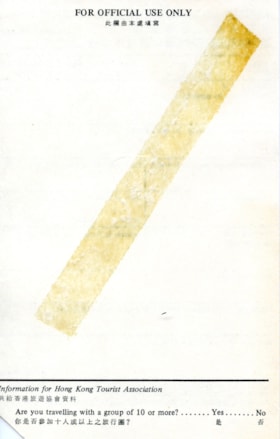
![Immigration form, [197-] thumbnail](/media/hpo/_Data/_BVM_Textual_Records/2019/2019_0006_0002_001.jpg?width=280)


![Interview with Josephine Chow by Denise Fong February 7, 2020, [1900-2020] (interview content), interviewed Feb. 7, 2020 thumbnail](/media/hpo/_Data/_BVM_Images/2017/2017_0036_0004_001.jpg?width=280)
![Interview with Julie Lee by Denise Fong February 6, 2020, [1920-1992] (interview content), interviewed Feb. 6, 2020 thumbnail](/media/hpo/_Data/_BVM_Images/2017/2017_0024_0027_001.jpg?width=280)
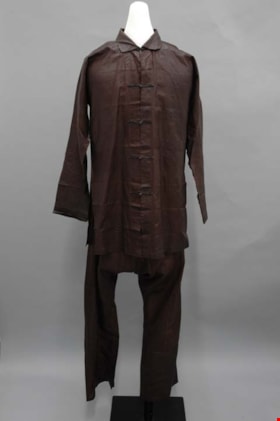
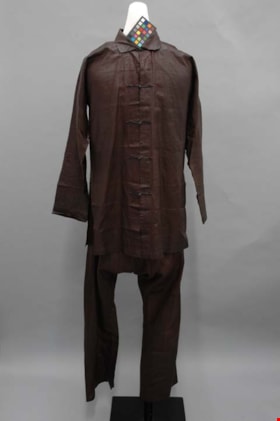
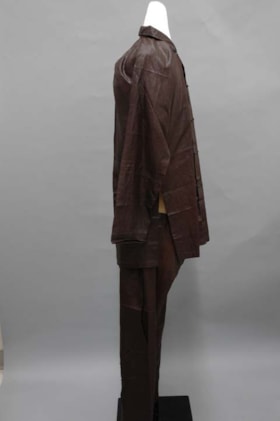
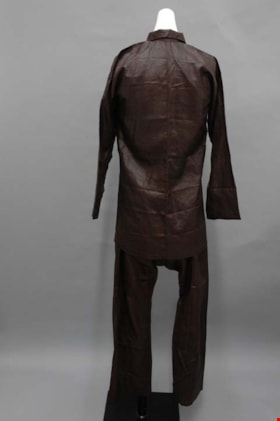
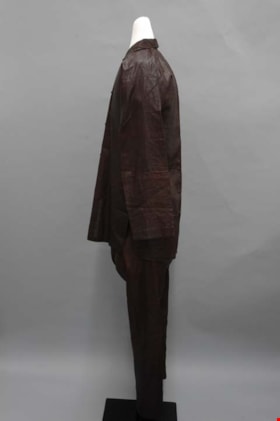
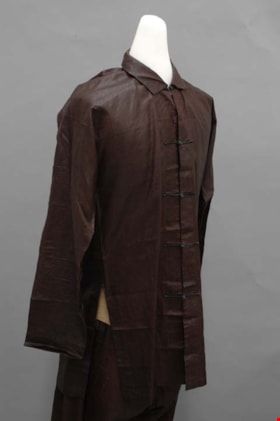
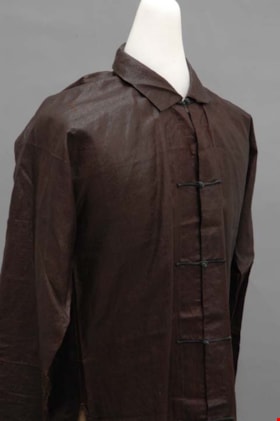
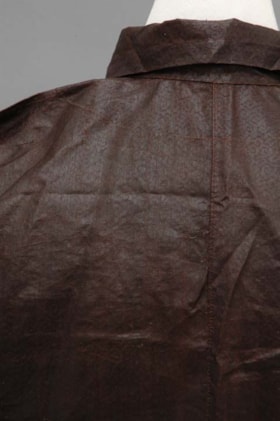
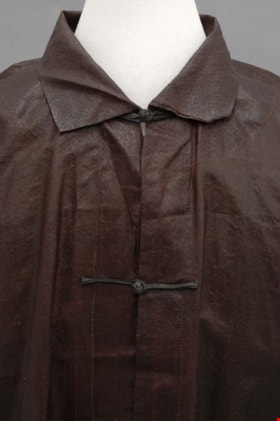
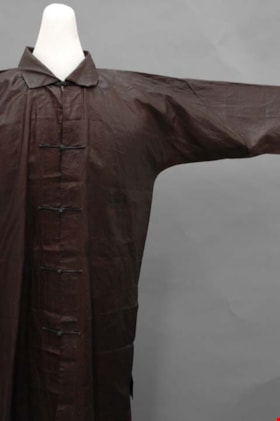
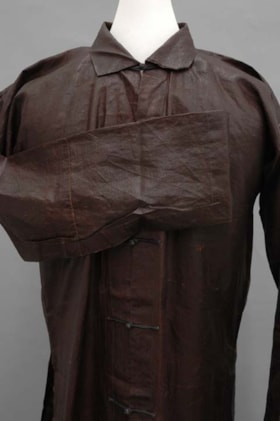
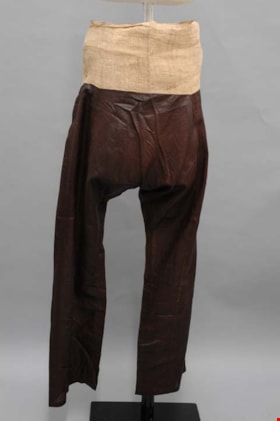
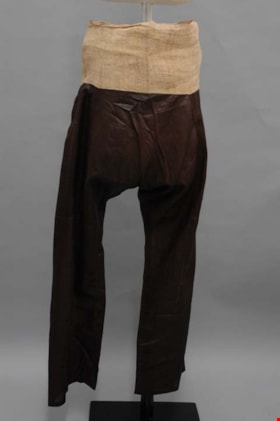
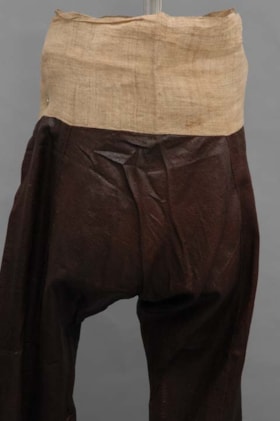
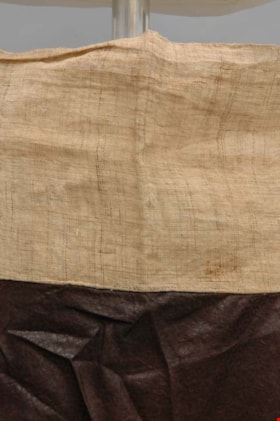
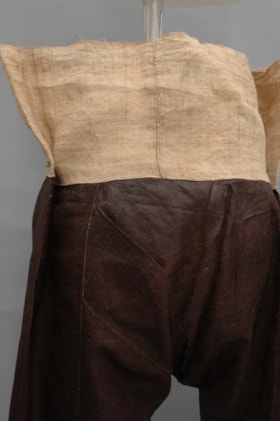
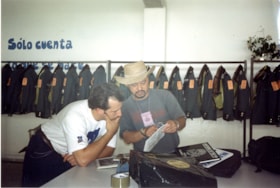
![Jimmy Chow and his son with Brad Pitt, [1993] thumbnail](/media/hpo/_Data/_BVM_Images/2022/2022_0021_0046_001.jpg?width=280)
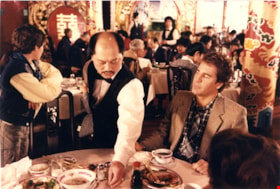
![Jimmy Chow holding a prop snake, [1987] thumbnail](/media/hpo/_Data/_BVM_Images/2022/2022_0021_0051_001.jpg?width=280)